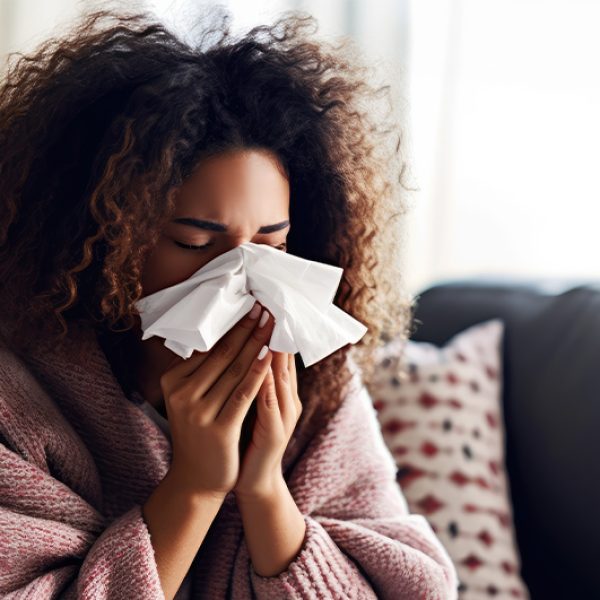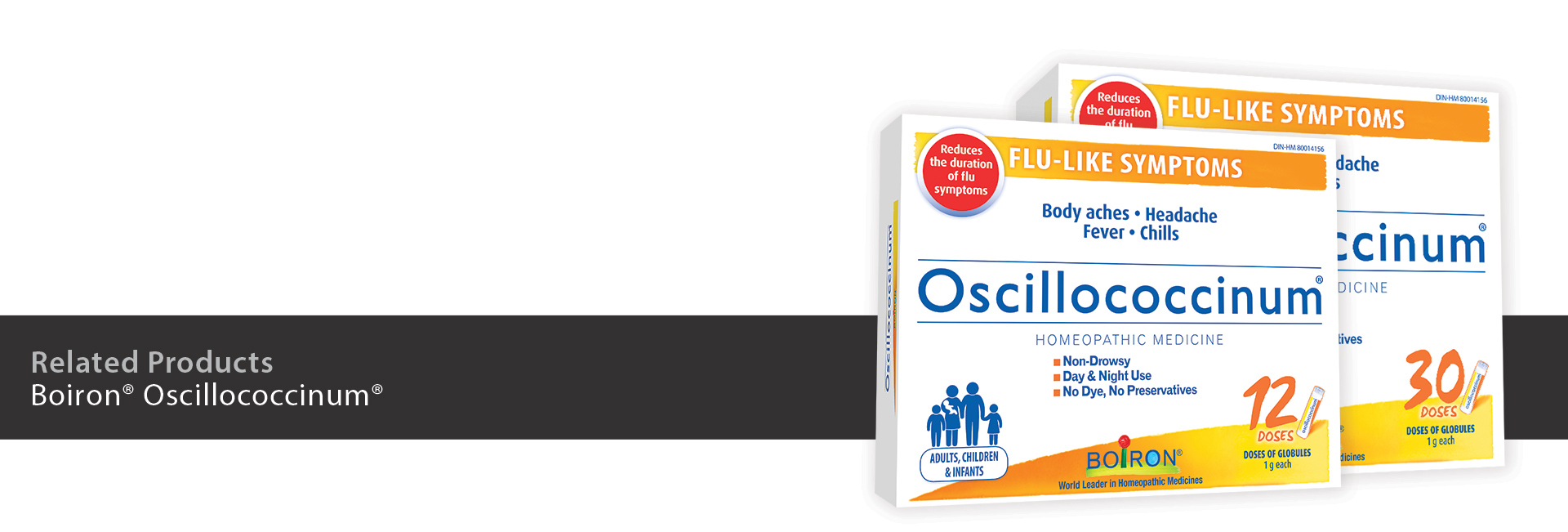

When Sniffles Strike: Is It the Flu or Just a Cold?
With the onset of the cold season, reduced sunlight, fatigue, back-to-school stress, and more time spent indoors, where pathogens circulate easily, our bodies are more vulnerable. Even if we maintain a healthy lifestyle and a balanced diet, the body becomes less able to resist external aggression. Among the “recurrent” viruses, comes influenza or flu. This is why, every year, widespread outbreaks of influenza occur during late fall. Discover how to recognize the flu and our tips to relieve its symptoms.
Influenza, What Is It?1
Influenza (flu) is a viral infection of the lungs and airways with one of the influenza viruses. Symptoms of the flu can include fever, feverish feelings or chills, cough, sore throat, stuffy or runny nose, muscle aches, headaches and fatigue, and a general malaise. The virus is spread by inhaling droplets coughed or sneezed out by an infected person or by having direct contact with an infected person’s nasal secretions. Symptoms can begin suddenly and generally start 1 to 4 days after infection.
Common Cold or Flu: How Can You Tell the Difference?
Common cold and flu have many symptoms in common, so it can be difficult to tell the difference. Both can cause coughing, nasal congestion and muscle aches. So, you may wonder: is it just a cold or do I have the flu? Although both are respiratory infectious diseases, they are caused by different viruses. Influenza produces symptoms that are more severe than common colds. Also, influenza affects cells much deeper down in the respiratory tract. Cold symptoms are usually milder than flu symptoms. In addition, a cold does not usually lead to serious complications, unlike the flu, whose most common complication is pneumonia and bacterial superinfection.
What Are Flu Symptoms?
- Fatigue or general weakness
Of course, when influenza hits people, they are very tired and feel weak. Often, they can feel so tired they can stay in bed for 2 days. Fatigue may persist for several days or occasionally weeks. - Chills and chilly sensations
When you feel bad, your body is shaking, you are cold and hot in a few minutes… These are the very first symptoms you notice when the flu hits you and are indicative that your body is preparing to fight the infection. - Fever and headache
Fever is a common characteristic of the flu. It can rise to 100°F to102°F (37.7°C to 39°C) and can last 3 to 5 days. A fever is the body’s natural reaction to an infection. Having a fever shows your immune system is reacting to fight the infection so it’s actually a good sign! It can be accompanied by painful headaches which can be worsened with intense light. - Aches and pains throughout the body
Aches and pain are common symptoms of flu. You may know this feeling when you have aches, but you have not done any sport that could explain them! Pain occurs most of the time in the back and legs. - Respiratory symptoms
Respiratory symptoms can include a sore throat, cough, and a runny nose. Cough can be dry at the beginning and become wet later with the production of phlegm.
What Should You Do in Case Of Flu?
- Rest
This is the first recommendation in case of a flu. Give your body a chance to recover. If you can, stay at home and take time for yourself: watch a movie, read, and have a lot of sleep and rest. It is also better to stay at home to avoid spreading the virus. - Stay hydrated by drinking plenty of fluids
Plenty of fluids is recommended to recover and help with flu symptoms, particularly fever. Drink a lot of water and do not hesitate to drink your favorite tea. - Try homeopathy to help you to relieve some of your symptoms.
Be prepared with Oscillococcinum! Oscillococcinum is a homeopathic medicine that relieves flu-like symptoms: body aches, headache, fever and chills. It reduces the duration of flu symptoms. If symptoms persist or worsen for more than 48h, consult a health care practitioner.
A Homeopathic Medicine
Oscillococcinum is a natural health product. It does not contain any dye or preservative. It does not cause drowsiness or sleeplessness. There is no contraindication to take it with other medicines.
The whole family’s ally against flu-like symptoms. According to a study conducted in March 2021, 98% of users are satisfied with Oscillococcinum. (Study conducted by Axes Research among 340 consumers of anti-influenza products in France) Oscillococcinum can be of benefit to the whole family: adults, children, and babies.
Pre-measured and easy to administer. Oscillococcinum is available in formats of 6, 12, or 30 doses. It comes in single-use doses. For adults and children from 2 years, you can pour the entire content of the tube into the mouth and let the pellets dissolve. For infants from 0 to 2 years, you must dissolve the contents of one tube in water before administering.
Reference:
1. Influenza (Flu) – Infections – Merck Manuals Consumer Version.

